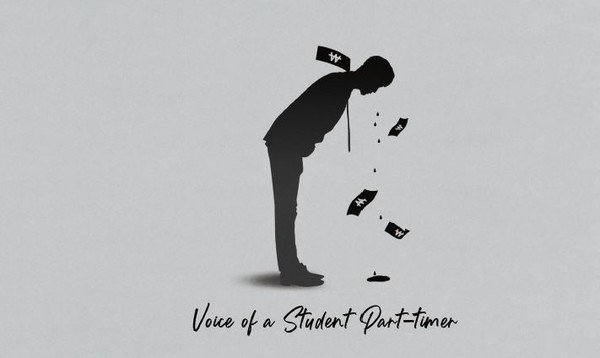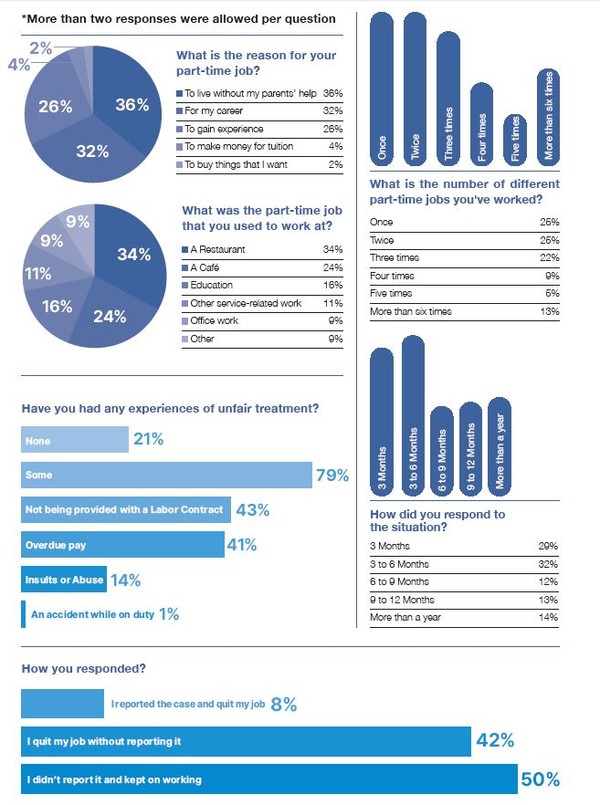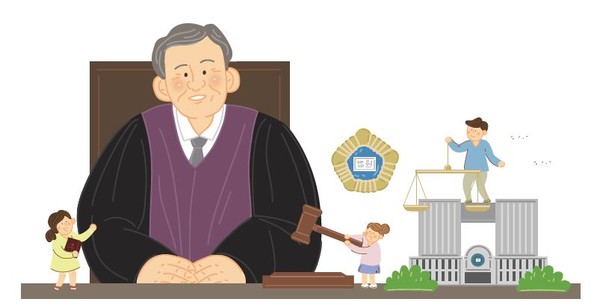
College students also have busy schedules in addition to their classes. Part-time jobs! Many students do both academic and part-time work, for various reasons. For example, they may work to cover their tuition and develop their independence, without receiving help from their parents, or others. Where do college students work, and what kind of work do they do? Let's find out about the reality of part-time jobs for college students.

The Experiences of Five Students
The most unfair treatment received by part-timers was "Not being provided with a Labor Contract." However, if you ask more questions to college students about their experiences, you will realize some uncomfortable truths hidden in their jobs. Starting with student A, let's find out more.
A “On the second day of my probationary period, the boss promised to train me for the job. Contrary to the promise, he came in drunk and didn't teach me anything. He did not even write a labor contract and unilaterally notified me of my working hours. After quitting the job, he insisted that he could not give money to a ‘scammer’ who ‘did not keep their working hours properly.’ It wasn't until later that I would get paid, but it was signifi cantly less than my original wage. I couldn't understand this situation, so I asked my co-workers about it. They informed me that they had not received the
proper wage like I did.” Moving on 'Overdue Pay', there were also cases where wages were paid solely to avoid accusation litigation. Take student B's experience for exa mple.
B “Because of problems in the workplace, I worked only half of my contracted time
for a period of about a month. As such, I received a lower wage. As I was working to
cover my living expenses, my situation was dire. However, I didn't get paid for two weeks (despite handing in my resignation in a timely manner). When I asked for my wages for this period, the boss just ignored me. When I decided to report the boss to the Ministry of Employment and Labor, and when I informed him of this, he immediately paid me.”
Another common experience, there were also parttimers who were ‘Verbally Abused’ and ‘Heard Personal Remarks.’ Let's consider the experiences of students C, D and E.
C “I worked as a server at a restaurant. the boss frequently called me out on my appearance and dress-attire (I would wear comfortable clothes and I didn’t wear make-up). As a result, because of the boss’s constant nagging, I had no choice but to quit my job. In hindsight, I still think I maintained a clean and professional look at that time.”
D “I was sexually harassed and molested by my boss. Unfortunately, I was unable to
report it to the police because I couldn't procure any evidence (such as CCTV or audio record files). I had no choice but to quietly quit my job.”
E “The store I was working for had relatively low sales, and the boss blamed me for it. Even though it was not my fault, the boss was angry because he felt that I neglected management. He continued to vent-out his accumulated stress on me. After working for a month, I quit because it put me under a lot of mental stress.”
The JBNU Globe interviewed a Certified Public Labor Attorney, Choi Young-jong, to seek legal advice on the unfair experiences of college students mentioned in the survey.
Often, even when part-time workers have a legitimate case against their employer, they may be reluctant to report their employer, out of fear of retaliation. What actions can be taken to prevent any such retaliation from employers?
Article 32 (3) of the Constitution stipulates that the conditions of work are mandated by law to ensure human dignity. Specifically, the Labor Standards Act deals with such cases, with strict repercussions for off enders. If a worker is treated in a manner that violates the Labor Standards Act, he or she can file a petition with a labor inspector at a local office such as the Ministry of Employment and Labor. Labor Inspectors func tion as work with special judicial police officers, with prosecutorial powers, so when they receive such complaints, they can investigate and punish off ending employers. Additionally, any act that jeopardizes the reporting of a violation of the Labor Stand ards Act can be punished as a separate crime. Therefore, workers do not have to worry about retaliation or disadvantages. Further measures are also taken when reporting to a labor official, that protects employees’ identity and minimizes their exposure to the case. This is because the procedure is not limited to specific cases, but rather serves as the method of investigation for all cases.
When a labor contract is not made, who is responsible? Is the worker responsible for not requiring it to be written?
According to Article 17 of the Labor Standards Act, employers are obliged to make a written statement to workers when they sign a labor contract. Failure to fulfill the obligations of preparing or delivering a labor contract may result in punishment to the employer. Workers don't have to take any responsibility in this case. If employers don't draw up a labor contract, it's illegal and thus the workers' demands are legiti mate. If they fail to fulfill this obligation, you can file a complaint with the local labor office and they will conduct an investigation into the issue. Furthermore, if a worker is treated unfairly because he or she was not provided with a contract, employers will be punished and if the verbal contract differed from the actual contract, the worker could even claim damages.
Is it illegal to monitor workers' behavior with CCTV installed for the security of the workplace?
The purpose of CCTV installation should never be ‘monitoring.’ Therefore, it is illegal to
monitor workers with CCTV installed for security purposes and it can be punished under the Labor Standards Act.
If a worker records or films a situation without the consent of the employer, to
collect evidence of abusive language and sexual harassment, can this also be used as legitimate evidence?
It can be used as evidence in court. Violence between words and actions are specified as prohibited acts in the Labor Standards Act, and punishment for them exists separately. Sexual harassment and workplace harassment are prohibited off ences. If you report it to the workplace, the office is obliged to investigate without delay. Protection measures for victims, such as changing departments or paid vacation, should be implemented first. After that, if sexual harassment is recognized, the perpetrator is obligated to take personal transfer. Failure to fulfill these obligations will result in sanctions through the Ministry of Employment and Labor. Apart from the
treatments above, retaliation against the victim can also result in double punishment.
If a worker voluntarily stops working due to the unfair treatment by the employer and as a result the worker fails to complete their contractual obligations period, is there a responsibility for the worker and the employer?
If the contract term is fixed, it is called a "nonregular worker," and if the term is not fixed, it is called a "regular worker." Regular workers can be guaranteed work up to the age of 60, while nonregular workers can be guaranteed work within a year of their contract. If the working period is contracted as non-regular, the employer cannot
arbitrarily fire the worker, and if he or she is fi red, it is considered an unfair dismissal. In addition, workers have the freedom to resign, so they can resign at any time. Therefore, if the resignation was done properly, there is no disadvantage to the employee.
If a worker who does not have any social insurance is injured while working, does the employer have to pay for the reatment?
Social insurance (employment insurance, national pension, health insurance, industrial accident insurance) is compulsory, so workers are obliged to sign up. The government covers this insurance. Also, it is the responsibility of business owners to ensure subs cription to such insurance policies. Therefore, workers can receive medical support, regardless of whether they have social insurance. They can apply for compensation of medical expenses to the Korean Workers' Compensation and Welfare Service. Moreover, WCI (Workers’ Compensation Insurance) follows the principle of "no negligence responsibility". Even if there is no fault of the employer, they are required to pay medical expenses unconditionally. The only time this principle does not apply is when workers hurt themselves. In addition, if an employer avoids obtaining industrial accident insurance, they can be liable for being an "industrial accident
concealment business." Workers naturally have the right to demand compensation for industrial accidents.
Is there anything that foreign workers should know before starting a job?
Foreign workers should be treated the same as Korean workers. Even in regard to their pay and the minimum wage laws, employers are required to pay foreign workers equally to that of Korean workers. Employers also need to check that foreign workers have the correct visa for working in the Republic of Korea. The most important thing is that foreign workers remember that their rights should not be reduced because of their nationality.

Institute Helps Part-time Workers On andOff Campus
The following information introduces organizations and centers that are available when fi nancial and legal support is needed, especially with regards to receiving unfair treatment at a part-time job.
Firstly, the Korean Workers' Compensation and Welfare Service provides for an ‘industrial accidents recovery’ program and employment insurance services, as a quasigovernmental organization. Even if the four major insurances are not subscribed to, due to the negligence of the employer, one can still be compensated. Similarly, if you apply for industrial accident care with the Korean Workers' Compensation and Welfare Service, you can receive the same compensation as the industrial accident insurance subscribers. In addition, 70% of one’s average wage can be paid as an unemployment benefit when industrial accidents prevent someone from working.
Secondly, the Korea Legal Aid Corporation under the Ministry of Justice that advocates basic human rights and promotes legal welfare with a focus on efficient legal structures. If you need legal help, but you are unable to go to a lawyer's office or you are unsure of where to ask, you can consult here. They provide counseling over the phone, online, or in-person consultations. Additionally, counseling over the phone is possible through dialing 132 from any phone. While the dropin (reservation-free) consultations have been suspended due to COVID-19, in-person consultations are still possible after making a reservation by phone or through the website. In addition, they provide another service that calculates a rough estimation of the litigation costs, and precedents in similar cases. So this could be very helpful if counseling was not possible.
Finally, there is also a specialized institution on campus that supports legal assistance services for JBNU students. This is the JBNU Legal Support Center, which strives to solve all legal problems both inside and outside the university, as well as part-time job-related problems. If it is diffi cult to visit the Korea Legal Aid Corporation, it is also a good idea to receive counseling at the nearby JBNU Legal Support Center. It is located in Room 510, on the 5th fl oor of the JBNU Graduate School of Law, and reservations for counseling can be made through 063-270-4615.
Sometimes people think that reporting part-time employers, even if they are unscru pulous, causes problems and noise. In addition, people think, "Surely, if I just endure it one more time, the trouble will stop brewing." However, this is like giving up your rights. It is people’s mission as a member of society to remedy any infringement of rights. The active search and protection of one’s rights are closely linked to the protection of the rights of all. Full-time and parttime workers alike. Let's fulfi ll our obligations as a member of society to prevent the recurrence of violation of the con stitutional spirit and actively regain our rights.

